T.C. Boyle on Doom

Tom Coraghessan Boyle (better known as T.C.) has stolen a deaf woman’s identity [Talk, Talk, 2006]; gotten into bed with famed sex researcher Alfred Kinsey [The Inner Circle, 2004], and married, divorced, and even murdered the loves of Frank Lloyd Wright’s life [The Women, now out in paperback]. He’s published 12 novels and more than 100 stories and has been the recipient of the PEN/Faulkner and a Guggenheim fellowship. To say that he is a prolific writer is, perhaps, an understatement.
Â
But it’s not the volume of material that Boyle has produced which has established him as one of today’s most interesting literary talents. It’s his characters, often ill-fated and always fallible; his always-changing story structure, which fools readers into sometimes undeserved empathy or harsh judgment; and his vivid descriptions, which sometimes take readers to places Boyle himself has never visited.
Â
In his latest short story collection, Wild Child and Other Stories (Viking), Boyle punishes a boy who cannot feel pain and asks a young girl to lie for her alcoholic father, among other ambiguous adventures in morality. The common theme throughout: What does it mean to be human?
Â
Â
LUCY SILBERMAN: You grew up in New York, but you’ve lived in California for quite some time now.
Â
T.C. BOYLE: I’ve been out here for 32 years. Right now, I’m sitting on the third floor of a cabin in the Sequoia National Forest, at 7,200 feet, looking at lots of snow and gigantic trees. I always workâ??wherever I amâ??but I find this is a good place to begin and end books, because you’re just away from the hassles of normal life.
Â
SILBERMAN: I understand that you renovated your other home.
Â
BOYLE: Yes. That one is Frank Lloyd Wright’s first California house, the George C. Stewart House; it celebrated its centennial last year. We’re only the fourth owners.
Â
SILBERMAN: Was moving into that house the beginning of your interest in Wright?
Â
BOYLE: Yeah. I knew about as much about him as most people doâ??he’s such an iconic figure; a cult figure, really. I wanted to learn more about him. I’ve written other books about men like him: Dr. Kellogg of The Road to Wellville and, more recently, Dr. Kinsey of The Inner Circle. He fit right in with this sort of American, progressive megalomaniac that I’m interested in. I considered writing about him from the very beginning.
Â
SILBERMAN: Is there something about that personality that especially appeals to you?
Â
BOYLE: Growing up as a free American, and as kind of a punk, not having to do anything I didn’t want to do, I’ve always been very suspicious of authority. These men are so fanatically devoted to their projects that they really become gurus, and dictators in a way. I often wonder, “What is the result of following, of being a follower?” Writing about Frank Lloyd Wrightâ??it’s the first time I’ve ever written about a fellow artist and his inspiration. I felt closer to him than I did to Kellogg or Kinsey, who were scientists.
Â
SILBERMAN: You don’t tell Wright’s story in The Women from his point of view, although he’s obviously the central figure.
Â
BOYLE: I’m always looking for a structure to tell a story. I don’t begin with blueprints; intuitive leaps occur throughout the process. In The Women, I was using this sort of Nabokovian layer of narration, where you don’t really know what’s true and what’s not. I always want the reader to be aware of the fiction going on, and the fun that I’m having.
BOOK TRAILER FOR THE WOMEN BY JAMIESON FRY
SILBERMAN: How do you get interested in the subjects you write about?
Â
BOYLE: I don’t really know how I feel about anything until I write a story about it.
SILBERMAN: I wanted to ask you about the title story in your new collection, the novella, Wild Child. It’s your telling of Victor, the wild boy of Avignon. How do you rework a story that has been the stuff of lore for centuries?
Â
BOYLE: I’ve been asked before if I had seen the Truffaut film, L’Enfant Sauvage. I had, but when it first came out, a long time ago. While writing this, I found a copy on the Internet. I thought I should see it immediately, but then I didn’t, and I haven’t yet. I didn’t want it to interfere with my own telling. In this case, it’s basically the same story (of course, with certain liberties).
Â
SILBERMAN: You know, many of your characters have experienced terrible, terrible things.
Â
BOYLE: You mean, why do the characters suffer so much? Well, because in the universe in which we live, we are without control. But in the universe that I create, I am the god and creator, and by god, my characters are going to suffer. [LAUGHS]
Â
SILBERMAN: I wanted to ask you, do you think you’re a pessimist? An optimist?
Â
BOYLE: Absolutely a pessimist. We are all doomed.
Wild Child and Other Stories is available now from Viking.
Â
Â






